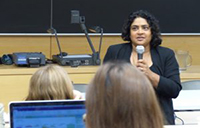The Faculty of Education’s annual two-day Summer Institute explored the topic of “Re/defining Educational Success: Purposeful Advocacy for Change.” The conference took place at the Victor Phillip Dahdaleh Building at York’s Keele campus and featured a full-day program on Aug. 25 and a half-day program Aug. 26. The annual event was presented by the York Centre for Education & Community (YCEC).

The Summer Institute brought together educators, youth, parents and community members to explore and share insights on how to redefine, challenge and build upon theories and practices in relation to what educational success can mean for students. The event presented a variety of keynote speakers and workshops, including featured keynotes Renu Mandhane, director of Ontario Human Right Commission, and Shaheen Azmi, director of Policy, Education Monitoring & Outreach, who focused on the use of human rights data; and Donna Quan and Roula Anastasakos from the Ministry of Education and Toronto District School Board who looked at unlocking student potential through data.
“The title of this year’s Summer Institute came out of multiple conversations and meetings with our planning committee on how the concept ‘success’ needs to be reconceptualized,” said Salima Kassam, a seconded faculty member and one of the co-chairs of this year’s organizing committee. “We know that historical and present groups of students are not succeeding in our school systems; the conference is a space for multiple stakeholders to think about what’s working and where we need to do better in the name of student achievement and well-being.”
According to Antonino Giambrone, co-chair of this year’s organizing committee, a large part of the collective goal as a committee was to co-create a space where community workers, classroom teachers, students’ families, young people, ministry officials and academics could come together to identify and disrupt the conditions that impede student learning and well-being, and identify and build on those conditions that enhance student learning and well-being. Regarding the focus on data and redefining education success, Giambrone said, “Accessing multiple forms of data can support these conversations, and can help those working in (formal and informal) education contexts better respond to disparities that are clearly reflected in the current available data on student achievement and well-being. We hope this year’s institute was a provocation for participants to find ways to act in response to marginalization and its impact on young people in communities and schools. ”
The ninth annual Summer Institute again featured exchanges among educators, policy makers, community members and youth.
“That we continue to bring these participants together to discuss issues in education speaks to the commitment of the Faculty to engage the respective communities in grappling with issues that will enhance the education of students,” said Professor and current Jean Augustine Chair in the Faculty of Education, Carl James. “This year the presentations by Renu Madhane, Shaheen Azmi, Donna Quan and Roula Anastasakos set out how we might grapple with equity and inclusivity by gathering and using data – particularly race data which they have indicated is vital to effectively address the needs and interests of today’s diverse student population.”
Participants took away multiple approaches that they could apply to their advocacy in community and school contexts. Importantly, the call for specific forms of data, particularly demographic data in relation to student achievement and well-being, lent to practical approaches to facilitating data-driven dialogue and accessing further data that includes student voice and pedagogical documentation.
Calls for re-defining “success” support the need for multiple forms of data to understand young people’s experiences in schools and beyond, and begin to address some of the systemic barriers that impact students in their schools and communities. Workshops provided concrete ideas of responding to such data, including ways to create the most effective climate for student learning and engagement.
They also addressed the importance of language with respect to issues of identity, and how language in school and community advocacy might be used in ways that affirm and value student experiences, specifically those of historically and presently marginalized individuals and groups.
For information on the full range of workshops that were presented, visit the 2016 Summer Institute website.


